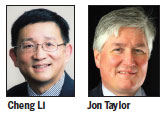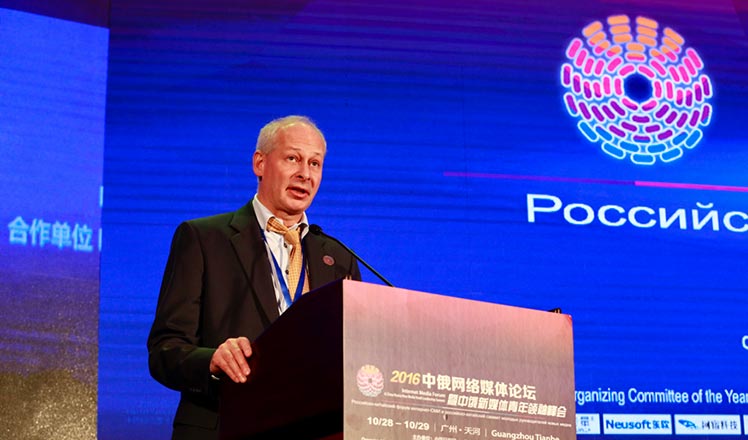Experts laud 6th plenum document
Updated: 2016-10-28 11:44
By Chen Weihua in Washington(China Daily USA)
|
|||||||||
China-watchers in the United States applauded the communique released on Thursday after the sixth plenary session of the 18th CPC Central Committee, which was held in Beijing from Monday through Thursday.
Cheng Li, director of the John L. Thornton China Center at the Brookings Institution, described the communique as a "very good document. I believe the sixth plenary session will have its status in CPC history," he said on Thursday.
According to Li, the document well emphasizes the relationship between collective leadership and the top leader's responsibility, especially in emphasizing the strict management of the Party.

While some Western media outlets have focused on the core status of Xi Jinping, general secretary of the CPC Central Committee, Li noted that this is not a new concept, but a title that has been used often throughout the previous leadership.
Rather than seeing the document as a subversion from previous Party documents as suggested by some Western media, Li said there is a continuity from contributions made by previous leaders such as the concept of "Three Representatives" by Jiang Zemin and "Scientific Outlook on Development" by Hu Jintao, both former CPC party chiefs.
Li, author of the latest book Chinese Politics in the Xi Jinping Era, said it is wrong to think that there is no supervision nor checks and balance in the Party.
"There is not only checks and balances, the document also emphasizes that there is no taboo and exception even for top leaders. This is a very strong language," he said.
He believes the elaboration on the relationship of collective leadership and individual responsibility is especially important, adding that no country has handled the issue well.
In his view, it will be problematic to give a president too much power, but it also won't work if the president does not have the necessary power. "This is a common challenge in social governance," Li said.
He noted that without enough power granted to Xi, it is hard to imagine how he can take on the tough job of fighting corruption and implementing reform measures.
Jon Taylor, professor of political science at the University of St Thomas in Houston, said strong, effective and unified party leadership, as well as cadre discipline, is of monumental importance for China under the CPC's leadership as it continues to deal with a host of economic, social and political issues.
He said the designation of "core" leader is a significant one. "It suggests that the Party wants both effective governance and the enforcement of 6th Plenum objectives and that can only be achieved with Xi as the 'core' leader," said Taylor, an expert on Chinese politics.
"The Party adopted new rules to regulate officials' behavior, tighten party discipline — particularly regarding the CPC's fundamental organization principle of democratic centralism. I expect that these rules will be expanded upon during both the 2017 Lianghui (NPC/CPPCC sessions) and the 19th National Party Congress," he said.
chenweihua@chinadailyusa.com
- Hefty award offered for deciphering oracle bone characters
- China Daily brings you 'sixth plenums' in past 35 years
- Party ramps up supervision
- 400,000 migrant workers flock to Xinjiang to harvest cotton
- China anticipates booming job market in 2016
- Online shopping platform selects cat as 'chief cute officer'
- Asia American leaders discuss civic engagement
- World's disabled get new champion
- Clinton, Michelle Obama make first joint campaign appearance
- Miss Philippines wins 2016 Miss International Beauty Pageant
- Trump's Hollywood Walk of Fame star destroyed
- Maduro activates Defense Council to seek solution to crisis

 China-Russia Internet Media Forum opens in Guangzhou
China-Russia Internet Media Forum opens in Guangzhou
 2016 Comedy Wildlife Photography Awards Finalists
2016 Comedy Wildlife Photography Awards Finalists
 NINED VR creates splash with virtual reality products
NINED VR creates splash with virtual reality products
 Splendid Sichuan captured in photos
Splendid Sichuan captured in photos
 Chinese baozi shop gains popularity in Harvard Square
Chinese baozi shop gains popularity in Harvard Square
 Chinese mariner on record-breaking voyage goes missing
Chinese mariner on record-breaking voyage goes missing
 2045-square-meter photo mosaic breaks world record
2045-square-meter photo mosaic breaks world record
 Red leaves reveal beauty of autumn
Red leaves reveal beauty of autumn
Most Viewed
Editor's Picks

|

|

|

|

|

|
Today's Top News
'Zero Hunger Run' held in Rome
Trump outlines anti-terror plan, proposing extreme vetting for immigrants
Phelps puts spotlight on cupping
US launches airstrikes against IS targets in Libya's Sirte
Ministry slams US-Korean THAAD deployment
Two police officers shot at protest in Dallas
Abe's blame game reveals his policies failing to get results
Ending wildlife trafficking must be policy priority in Asia
US Weekly

|

|









